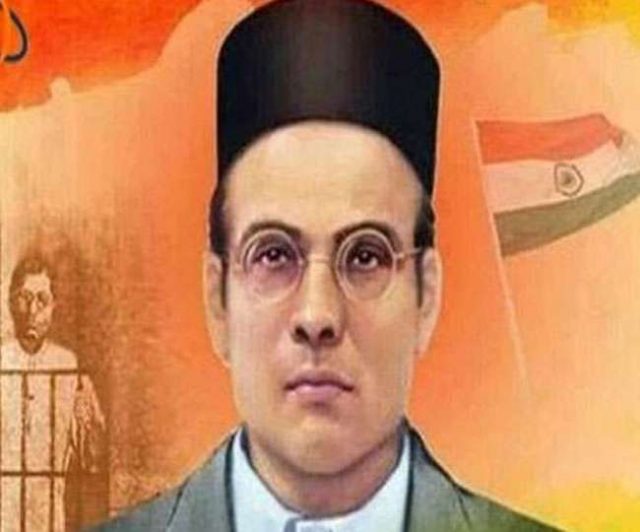
–Ananth Seth
It was on 28th May 1883 that a ‘remarkable son of India’ was born. The four words in quotes – this should be of attention for the perpetual controversialists – are the words used by one of the leading lights of the organization which has arraigned itself against the ideology professed by Savarkar. Yes, it was Indira Gandhi from Congress, who had referred to Savarkar as a remarkable son of India.
Savarkar was indeed a remarkable son of India: he was the first Indian to pen a work which gave an Indian perspective of the First War of Independence; he was the one who infused the word and the concept of Hindutva – coined by Chandrakant Basu, a doyen of economic nationalism in Bengal – into the national psyche and it was he, who on the Vijay Dashmi tithi of 1905 (much before Gandhi’s Quit India Movement) had set up a bonfire burning all foreign goods and clothes. A prolific poet and one of the foremost and staunchest proponents of Hindu Rashtra, Savarkar had also championed, much before the clarion call of Ambedkar, the cause of a caste-free India by promoting inter-caste dining and by building a temple in Ratnagiri – called Patit Pavan Temple – that allowed entry to all people of all castes.
An objection, if raised regarding the mention of Indira Gandhi in the very first paragraph of a Savarkar related Article, can be a valid objection. Well, that mention has been made to underscore the fact that despite the Queen Mother of the dynasty holding Veer Savarkar in high stead, the courtesans have been incessant and untiring in their opposition of Veer Savarkar and of the ideology he professed and is identified with. The Congress (INC) does not leave even half an opportunity to talk about a purported mercy plea submitted by Savarkar praying for his release from the Cellular Prison at Andamans.
Rather than delving into the Ifs, Buts and Whats of that petition, I would prefer to subject the discussion to logico-legal rigor. The maxim Those Who Fly May Fight Again, Which They Can Never Do If They Are Slain is attributed to Demosthenes, a Greek statesman and orator of ancient Athens, who was opposed to Alexander. The connotation of this maxim is that if defeat looks certain in a battle, a tactical retreat is rather a smart move to make so that one can come back to take on the enemy with better arms, more vigor and improved strategy. The conditions which the inmates of the Cellular Jail faced were sub-human to say the least. Added to this was the fact that Savarkar was the ‘chosen one’ whom the Brits had marked for ‘special treatment’. In such a scenario, a diseased and debilitating mortal end was certain had Savarkar continued under incarceration there.
Legally speaking, right to life and right against exploitation are constitutionally guaranteed fundamental rights which are also included in the Universal Declaration of Human Rights. That the UN Charter or Constitution did not exist at that point is a flimsy objection which is beside the point because those rights have been acknowledged and have existed since wisdom has dawned upon humanity, although the terminology and packaging may have been different.
Stratagem to overcome the adversary to fight another day is not cowardice. Had Savarkar felt guilty or had he intended to hide such acts, he would not have detailed them in his autobiography My Transportation for Life. Chhatrapati Shivaji too used stratagem to bide his time during his imprisonment at Agra and later, avenged all insults when he became powerful enough. Vietnam’s communist leader Ho Chi Minh rescued himself from Kuomintang Prison by sending clemency pleas and assuring cooperation. Try speaking against Ho Chi Minh in Vietnam and you will know it. But as for India, we are Oh So Democratic!
What Savarkar did after his release (joining Hindu Mahasabha, opposing talks with Jinnah in 1944, popularizing the concept of Akhand Bharat, continuing with his Shuddhi movement etc.) makes it amply clear that he was not servile or pusillanimous toward the Brits and that he did not cooperate with them. Rather, he continued with his agenda and ideology in a way which was feasible during those times and under the constraints which were in place then.
An inability to read between lines is generally evidence that the reader is unable to apprehend any insight or connotative meaning beyond the literal denotation. Being able to infer and deduce ideas from raw facts is simply not something everyone can do; definitely not the pseudo-seculars for whom Hindutva is anathema.
“The one Who Made Hindutva sharper, his name is Vinayak Damodar Savarkar”














